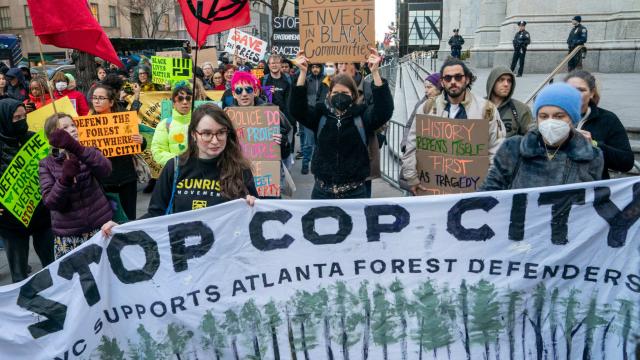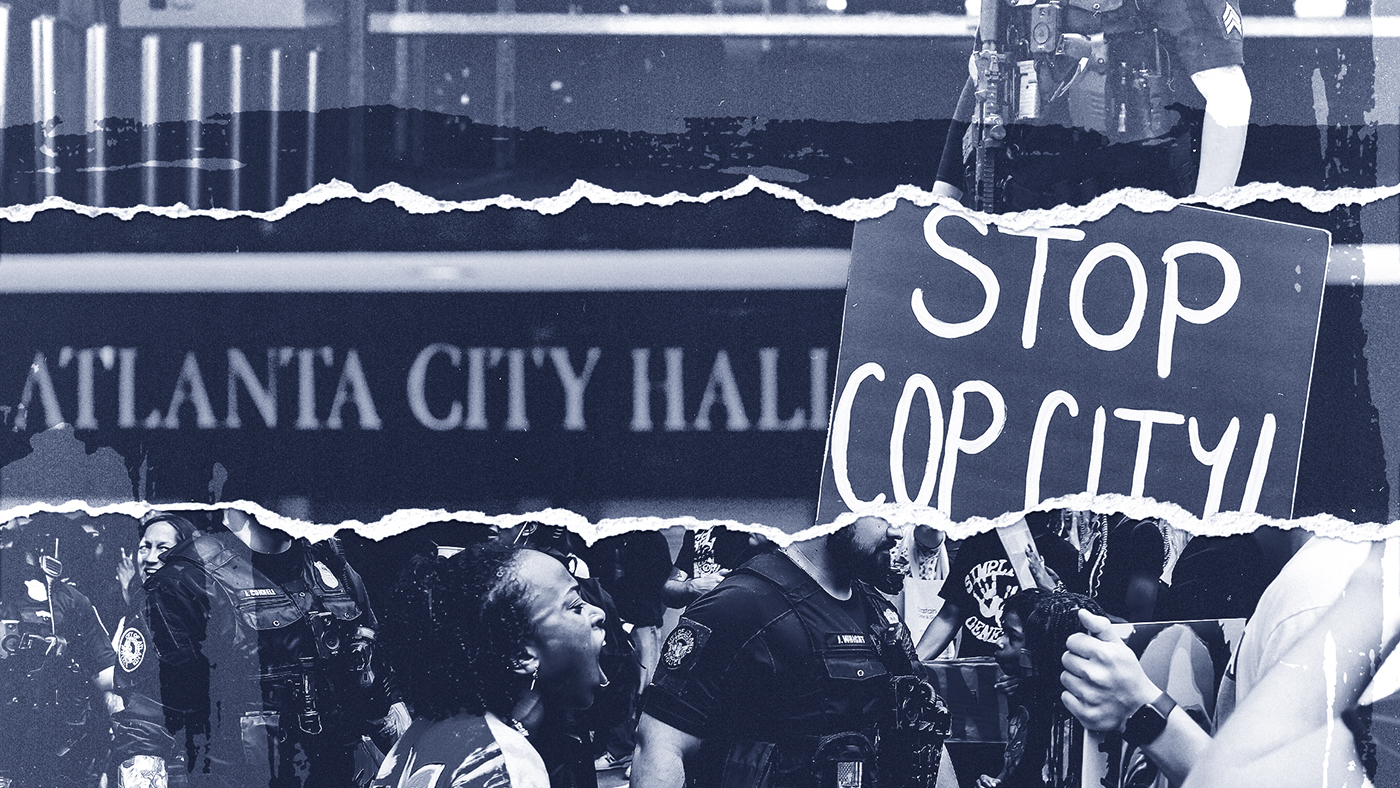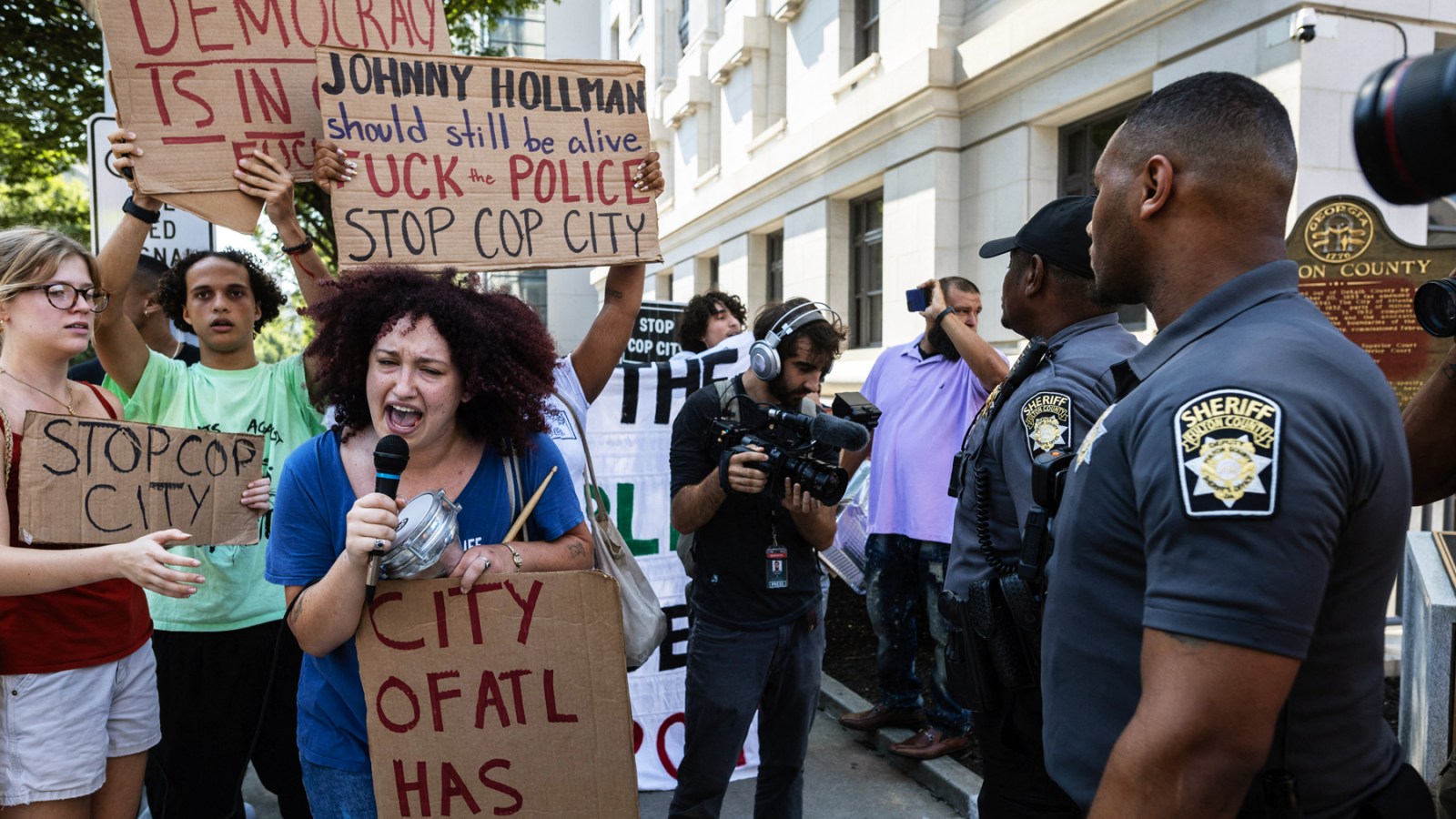
The same Georgia grand jury that indicted former President Donald Trump and his legal team on RICO charges for allegedly forming a criminal enterprise to overturn the results of the 2020 election has also indicted a group of 61 ‘Cop City’ protesters using Georgia’s RICO statute. One of these indictments is the result of a careful, meticulous investigation based on piles of evidence suggesting a conspiracy to commit multiple felony crimes. The other is baseless political persecution of Constitutionally protected activity.
While the same grand jury issued both RICO indictments, Fulton County District Attorney Fani Willis, a Democrat, indicted Trump, and Georgia Attorney General Christopher Carr, a Republican, indicted the protesters. The difference between the two indictments is stark, and the sloppiness of Carr’s indictment suggests that, rather than attempt to prosecute a criminal organization, Carr is simply abusing the legal system in order to create a false equivalence to advance Trump’s narrative that he’s the victim of a politically motivated prosecution. Rather, Carr is the one carrying out a blatantly political prosecution, and it’s likely that the ‘Cop City’ protesters will not only have their charges dropped, but that they’ll have a case to sue Carr’s office for malicious prosecution.
A sloppy attempt to criminalize protest
The contrast in quality between these two RICO cases is especially noticeable when comparing them side by side. Willis’ RICO indictment (PDF link) of Trump and his associates makes its case by clearly stating the criminal enterprise started on November 4, 2020, the day after the presidential election. She lays out how Trump and his lawyers, including Rudy Giuliani, John Eastman, Jeffrey Clark, Kenneth Chesebro, Jenna Ellis, and others conspired to overturn the 2020 election in a variety of ways “including, but not limited to, false statements and writings, impersonating a public officer, forgery, filing false documents, influencing witnesses, computer theft, computer trespass, computer invasion of privacy, conspiracy to defraud the state, acts involving theft, and perjury.”
Carr’s indictment (PDF link) states that the alleged criminal enterprise ‘Cop City’ protesters are accused of organizing began on May 25, 2020 – the day George Floyd was murdered by the Minnesota Police Department. Right off the bat, this is an impossibility, as the ‘Cop City’ project – the proposed bulldozing of hundreds of acres of forest to build a $90 million police training center – wasn’t announced until March of 2021. The fact that such an obvious, glaring error was overlooked by Georgia’s top legal official will likely be a boon for protesters’ attorneys when seeking to dismiss the charges. A “criminal enterprise” to stop something a year before it was ever publicly announced is not a criminal enterprise. The fact that Carr chose the start of the George Floyd uprising as the beginning of the alleged enterprise is very revealing, as this suggests he views all police brutality-related protests as criminal.
After naming the defendants and accusing them of racketeering, Carr’s indictment opens with the insinuation that the ideology of anarchy is inherently violent, thus deserving of prosecution. Carr’s reaching goes even further in attempting to connect basic grassroots organizing concepts like collectivism, mutual aid, solidarity, jail support, civil disobedience, and publishing pro-movement “zines” to violent anarchist activity.
“These anarchist ideals and actions undergird the occupation of the forested area that will be the site of the Atlanta Public Training Center,” the indictment reads.
The National Lawyers Guild, which often provides pro bono representation to those arrested and prosecuted for First Amendment activity, condemned Carr’s RICO indictment in a public statement, saying that Carr sought to “portray a popular movement as a criminal conspiracy.”
The indictments are clearly intended to serve a political end: that is, to silence the protest movement, to prevent it from having access to attorneys, bail support and even legal observation. Among the 61 being charged include people arrested for handing out flyers, for serving as legal observers, for providing bail support and for fundraising for the campaign. The indictment itself stretches back to the day of George Floyd’s murder by Minneapolis police, despite the fact that Cop City was not announced until 11 months later. It attempts to render all mass protest against police violence and racism – including the killing of Rayshard Brooks by Atlanta police – an “unlawful conspiracy” or “racketeering.”
Not only does the indictment pose a direct threat to Constitutional rights, most notably the First Amendment rights of freedom of expression and association, it further comes in violation of international law, notably the U.S.’ obligations under the International Covenant on Civil and Political Rights.
The ‘Stop Cop City’ movement’s RICO charges will likely be dropped, just as the felony rioting charges against the J20 protesters on Inauguration Day 2017 were eventually dropped. But AG Carr is not alone in his attempts to chill dissent: The whole of Atlanta’s municipal government, even across two different mayoral administrations, is also culpable in the attempt to criminalize protest of an expansive, militarized police state. In fact, it could be argued that if anarchy is indifference to and disrespect of existing government institutions, that AG Carr and Atlanta’s municipal officials are the real anarchists.
Who are the real anarchists?
Despite more than 15 hours of public comment earlier this year – with 230 comments made against Cop City and only four in favor of it – the city council went ahead with the project anyway and appropriated $67 million toward Cop City at 5:30am. Activists vowed to put Cop City construction on the ballot and organized a referendum campaign the day after the council’s decision to fund the vastly unpopular proposal.
While city code states a referendum only needs 15 percent of voters (roughly 58,000 people) to qualify for the ballot, the city recently announced a new, onerous “signature matching” verification process, where signatures that don’t exactly match a voter’s signature on their voter registration form are thrown out. That process has been criticized as unfair to the elderly, the disabled, and other marginalized populations, who can often have varying signatures. Activists have gathered more than 100,000 signatures, though they have until September 23 to submit a final count of signatures.
Because their efforts at using the democratic process to stop the project have been rebuffed at every turn, protesters say they have no choice but to literally put their bodies on the line to stop construction of Cop City, often chaining themselves to construction equipment, trees to be bulldozed, and each other to delay and obstruct the project using all nonviolent means available. The ‘Stop Cop City’ movement is similar in its tactics to the movement to stop Keystone XL pipeline construction in 2012, and the Standing Rock Sioux’s movement to stop the Dakota Access Pipeline with civil disobedience in 2016.
Just as those campaigns were met with a violent police response, the ‘Stop Cop City’ movement has faced similar repression by police. Since the protests began, police have arrested protesters on domestic terrorism charges for merely throwing rocks and bottles, arrested bail fund organizers on money laundering charges for simple crowdfunding campaigns to get protesters bailed out of jail, and even shot and killed protester Manuel Esteban Paez Teran (who used they/them pronouns), whose autopsy reported had their hands extended above their head and was sitting with their legs crossed when they were shot 57 times. Police allege Teran fired a weapon at them and that they acted in self-defense, though no gunpowder residue was found on Teran’s hands. Body camera footage of the shooting is also not available.
At the end of the day, the evidence is clear: ‘Stop Cop City’ activists’ Constitutionally protected actions to prevent construction of the police training city – from speaking out at city council meetings, to gathering petition signatures, to civil disobedience – have been met with silence and indifference, overwhelmingly violent police response, and now an arguably malicious prosecution based largely on political views. The only disrespect for the democratic process, the Constitution, and the mechanics of government have come from Georgia law enforcement and municipal government officials; if anyone is to be labeled as anarchists, it’s them.
AG Carr’s RICO of ‘Cop City’ protesters only helps Trump
Carr resigned as the head of the Republican Attorneys General Association in April of 2021, after the organization robocalled supporters and asked them to march on Washington, DC on January 6, 2021 to “stop the steal,” referring to Congress’ certification of the 2020 electoral college count. To his credit, Carr reiterated that he didn’t sign off on the robocall, and stood by his statement that Biden fairly won the election, that former Republican Senators Kelly Loeffler and David Perdue lost, and that there was no basis to argue otherwise. Carr even defeated a Trump-backed primary challenger in the 2022 Republican primary for the Attorney General race, with the challenger largely running on a platform of avenging Trump’s loss from alleged voter fraud that even Trump’s own Attorney General said never happened. A search of the FEC donor database shows no record of a Christopher Carr from Georgia making any political donations to any of Trump’s PACs, joint fundraising committees, or state-based fundraising arms.
Given all of this, Carr’s timing in filing the RICO indictment is confusing, given that the charges are brazenly political in nature, and that the indictment comes on the heels of Fani Willis’ RICO of Trump and his legal team. The mere existence of Carr’s indictment will only serve to advance Trump’s false narrative of being prosecuted for his politics, and arguably even gives Trump an opening to build common ground among Georgia-based leftists, who are seeing firsthand how their comrades are being politically persecuted by Georgia law enforcement officials. The fact that the same grand jury that indicted Trump also indicted ‘Cop City’ protesters will almost certainly serve as stump speech fodder for the former president as he campaigns in Georgia ahead of the 2024 Republican presidential primary.
If Trump is convicted of his alleged crimes in Georgia yet still manages to get elected in 2024, he would be unable to pardon himself, as a pardon for state-level crimes can only come from a governor. Aside from Manhattan District Attorney Alvin Bragg’s indictment of Trump for alleged falsification of business records (regarded as the weakest of the four cases against him) Trump’s charges in relation to the January 6 insurrection and his alleged mishandling of classified documents are under the jurisdiction of the federal judiciary, meaning both cases could be thrown out with a presidential pardon. But by having a justification to say the Georgia case is politically motivated, it’s not an impossibility to see how Trump and his legion of supporters could pressure Georgia Governor Brain Kemp – a Republican – to grant him a pardon if convicted.
The case against ‘Cop City’ protesters follows the pattern of Republican abuse of the legal system to create false equivalences to advance their political narrative. The recent standoff in the US House of Representatives over a must-pass government funding package is now tied to extremist Republicans’ wishes to impeach President Joe Biden, with House Speaker Kevin McCarthy (R-California) announcing the inquiry on September 12. While no evidence exists linking President Biden or his administration to Hunter Biden’s international business dealings, Republicans know that the inquiry accomplishes the goals of both distracting from Trump’s pending criminal trials, and diluting the seriousness of Trump’s two impeachments by also tarnishing Biden’s legacy with a potential impeachment of his own.
AG Carr’s RICO indictment follows this same path by suggesting that left-wing protesters are also part of an alleged criminal conspiracy, just as Fani Willis has suggested with her indictment of Trump. The best way to prevent Carr from preventing accountability for Trump is for protesters’ attorneys to dismiss the charges expeditiously, and for Carr’s office to be sued for malicious prosecution. Abuse of the legal system for political purposes is happening, but it’s Republicans doing it.
Carl Gibson is a freelance journalist and columnist whose work has been published in CNN, USA TODAY, the Guardian, the Washington Post, the Houston Chronicle, Barrons, Business Insider, the Independent, and NPR, among others. Follow him on Bluesky @crgibs.bsky.social.















